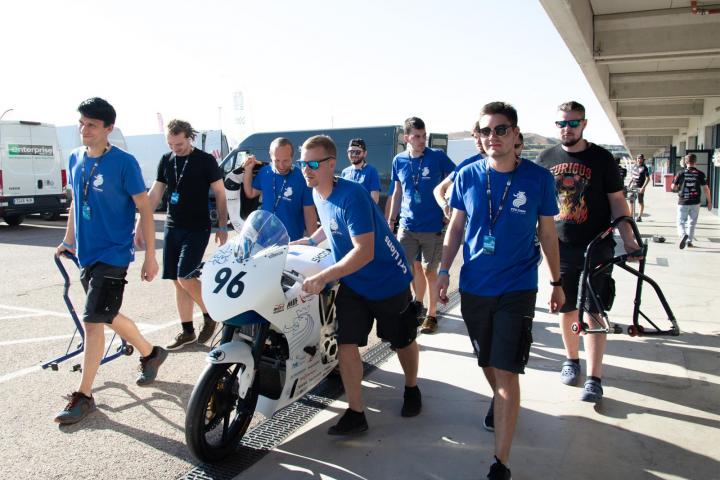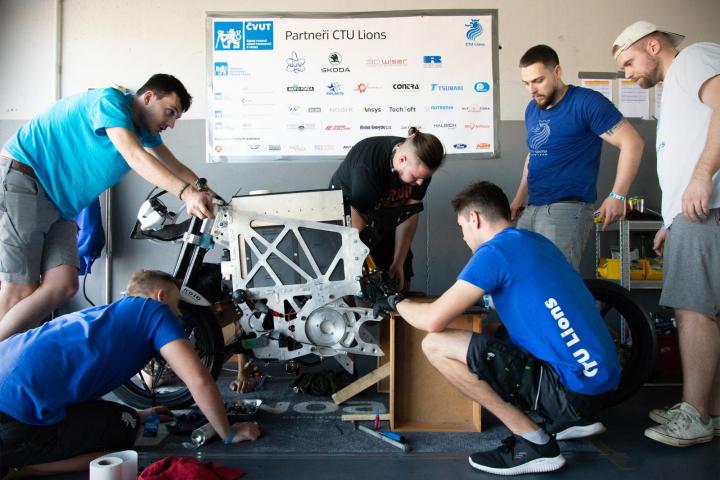
The CTU Lions have been fully dedicated to the development and building of electric racing motorcycles for several seasons. This year they introduced the new EVO 3.0 Electric road bike, the successor to the EVO 2.0 Electric. Competition rules prescribe all teams to have identical components (e.g. engine, tires, brakes), which are different from the 2019-2021 seasons, there have been major design changes from the previous EVO 2.0. The biggest difference and the reason for the different concept is the water cooling of the engine, which allows for an increase in power up to 48 kW. The subsequent development and design of all the motorcycle's components and systems is entirely in the team's hands.
"A different battery chemistry was also chosen, in this year's edition we composed the battery box of 84 (28 in series, 3 in parallel) Li-Pol cells with a total capacity of about 7 kWh. The frame is welded from waterjet-cut aluminium plates, the rear swingarm is made from machined aluminium blanks. The power transfer solution from the motor to the rear wheel is also unique. For this purpose, a primary and secondary transmission was designed, which allowed the axis of the motor shaft to be placed in the axis of the swingarm. At the same time, this solution offers a wide choice of gear ratio, so it is possible to use a very short gear for a gymkhana or acceleration competition, and conversely a long gear for maximum speed on the long straight at the Aragon circuit. Also improved is the original innovation from EVO 2.0, which is the variable geometry system - specifically the adjustable angle of the front fork, where it is possible to choose between a more agile or more stable setting of the bike's behaviour," says team leader Josef Svoboda.
The competition season, which is divided into two years, consists of a number of different challenges, culminating in a final event in Spain. The preparatory part is referred to as MS1, the final part on the circuit as MS2. A maximum of 500 points can be earned for each. Simply put, MS1 is how the team develops and works on the bike over two years; MS2 is the results at the final event - how fast the bike is in the various disciplines on the circuit.
In the MS1 part, the CTU Lions team achieved their best result so far - 7th place in the global competition. The MS1 consists of concept development (50 points), product design including component design, simulations and drawings (90 points), prototyping, manufacturing and testing (60 points), innovation (100 points), management plan, how the team works and operates (100 points), as well as three presentations: the InnoCall for 35 points, the MS Pitch for 45 points and the MS1 final presentation for 20 points.
Despite all the preparation, the CTU Lions team unfortunately did not do too well in the MS2 part due to technical complications, which despite their success in the MS1 part moved them to 13th place overall.
The MS2 section of the MotoGP circuit at Aragon starts with static and dynamic acceptance tests, where the motorcycle is subjected to a series of tests to verify safety and compliance with the rules and very strict requirements.
Other tests include the rain test, where the motorcycle is exposed to heavy artificial rain and the insulation must not be broken and the bike must be able to leave the test. The following dynamic acceptance test is a test ride by professional riders who must confirm that the motorcycle behaves safely and predictably during the ride.
The acceptance tests are followed by dynamic tests: acceleration, braking on the minimum track and gymkhana, driving skills between cones. Practice rides follow, which are mainly used for final tuning of the bike and also to familiarize the rider with the race track, however, even here it is possible to earn a few points for regularity and top speed.
The next step is qualifying, from which the fastest 15 teams proceed to the final race. This year, qualifying was expanded to include a play-off, a special race for teams that did not set good enough times in the regular qualifying - effectively a small race in which the three fastest teams advanced to the final race.
Due to partial thermal damage to the engine, the CTU Lions team unfortunately did not place on the podium. "Like other teams, we encountered major complications in the form of enormous overheating of the engine, especially the rotor. Because the engine is the same for all teams and protected against seals, it was not possible to examine the internal structure of the engine in detail and, for example, to modify the cooling system. Most of the teams used freshly purchased engines for qualifying and the race, which unfortunately we did not have in stock. The lesson for us is to better test the engine and possibly reverse engineer it in a non-invasive way, which would have alerted us to the design specifics of the supplied components," says Přemek Toman.
A big thank you to all the partners and sponsors of the team, whose support makes the team possible:
- Czech Technical University in Prague
- CTU Faculty of Transporation Sciences
- Department of Transportation Systems
- CTU Faculty of Mechanical Engineering
- Department of Engineering technology
- RCMT
- Centre of Vehicles for Sustainable Mobility
- CTU Faculty of Electrical Engineering
- Department of electrical drives and tracktion
- ÚJV Řež, a. s.
- Škoda Auto, a. s.
- 3Dwiser s.r.o.
- Ricardo Prague s.r.o.
- MOTOFORZA, spol. s.r.o.
- Shenzhen Melasta Battery Co., Ltd
- CM Solutions, s. r. o.
- Contra Praha, s.r.o.
- Tsubaki Automotive Czech Republic
- PP Tuning, Aluminium Performance Parts s.r.o.
- TME Czech Republic, s.r.o.
- NOARK Electric Europe s.r.o.
- TechSoft Engineering, spol. s r.o., Ansys
- RUTRONIK Elektronische Bauelemente CZ s.r.o.
- Autoložiska Kotvaldovi, www.autoloziska.cz
- First Klassik Motor
- Engine Evolution
- Abraham Kovovýroba s.r.o.
- Jan Čermák ml.
- Halbich s.r.o., Öhlins
- MSC Software s.r.o.
